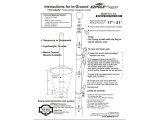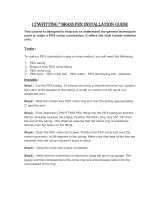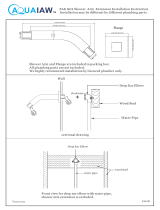
3
IM-PF 573225 0415 (Commercial)
Contents
1 Introduction
1.1 Viega PEX Solutions ........................ 4
2 ViegaPEX Ultra Tubing
2.1 What is PEX .............................. 5
2.2 Properties and performance ................. 6
2.2.1 ViegaPEX Ultra properties and performance .. 6
2.2.2 Tubing markings ...................... 6
3 FostaPEX Tubing
3.1 FostaPEX properties and performance ......... 7
3.2 Tubing markings ........................... 7
4 Codes, Standards and Certifications
4.1 Codes ................................... 8
4.2 Standards ................................ 8
4.3 Certications ............................. 8
4.4 Specifying Viega PEX Systems ............... 9
5 Viega Manifolds
5.1 Viega manifold markings ................... 10
6 Viega PEX Press Fittings
6.1 Viega PEX Press Polymer. . . . . . . . . . . . . . . . . . . 11
6.1.1 Viega Smart Connect feature ........... 11
6.2 Viega PEX Press Bronze ................... 11
6.3 Viega PEX Press tting markings ............. 11
6.4 PEX Press Tools .......................... 12
6.4.1 PEX Press power tools ................ 12
6.4.2 PEX Press hand tools ................. 12
6.5 Making a Viega PEX Press connection with hand
tool .................................... 13
6.5.1 Trimming and inserting the tubing ........ 13
6.5.2 Pressing with a hand tool .............. 13
6.5.3 Pressing with a power tool ............. 13
7 PEX System Sizing
7.1 Code references .......................... 14
7.1.1 U.S. code approvals .................. 14
7.1.2 Canadian code approvals .............. 14
7.2 Sizing a PEX system ...................... 14
7.2.1 General ............................ 14
7.2.2 Sizing methods ...................... 14
7.3 Viega PEX tubing ......................... 15
7.3.1 Flow velocity table. . . . . . . . . . . . . . . . . . . . 15
7.3.2 Pressure loss table ................... 16
7.3.3 Velocity limits ....................... 17
7.4 Viega ManaBloc/MiniBloc .................. 17
7.4.1 Pressure loss ........................ 17
7.5 Viega PEX Press ttings .................... 17
7.5.1 Equivalent feet of PEX tubing factor ...... 17
7.5.2 Viega PEX Press friction loss — equivalent
feet of SDR9 PEX tubing .............. 17
7.5.2.1 Calculating pressure drop through
ttings ....................... 18
7.5.2.2 Reducing ttings ............... 18
8 System Design
8.1 General ................................. 19
8.1.1 Manifold installations ................. 19
8.1.1.1 Homerun ..................... 19
8.1.1.2 Zone / combination ............. 19
8.1.2 Grounding / bonding .................. 19
8.1.3 Hybrid ............................. 20
8.1.4 Connecting PEX to metal tubing ......... 20
8.2 Hot Water System Design .................. 20
8.2.1 Re-circulation systems ................ 20
8.2.2 Balancing / velocity ................... 21
8.2.3 Insulation ........................... 21
8.3 Fixture connections ....................... 21
8.3.1 Carrier systems ...................... 21
8.4 Water quality ............................ 22
8.4.1 Piping details ........................ 22
8.4.2 Fittings ............................. 23
8.5 Thermal expansion compensation ............ 23
8.5.1 Calculating expansion loops and offsets .. 24
8.6 Structural considerations ................... 28
9 Installation
9.1 General handling ......................... 29
9.1.1 Handling ViegaPEX tubing ............. 29
9.1.2 Bending ViegaPEX tubing .............. 29
9.1.3 Support ViegaPEX tubing .............. 30
9.1.4 PEX hangers ........................ 31
9.1.4.1 Trapeze hangers ............... 31
9.1.4.2 Clevis / tear drop hangers ........ 31
9.1.4.3 PEX support trays .............. 31
9.1.4.4 Pipe labels .................... 31
9.1.5 Noise and water hammer in PEX systems .. 31
9.1.6 Chemical compatibility ................ 32
9.1.6.1 Spray foams .................. 32
9.1.6.2 Termiticides / pesticides ......... 32
9.1.7 Freeze protection .................... 32
9.1.7.1 Insulation ..................... 32
9.1.7.2 Heat tape .................... 32
9.1.8 Freeze repair ........................ 32
9.1.9 Condensation control ................. 33
9.2 Building water service installation ............ 33
9.2.1 Installing PEX below grade as service line .. 33
9.2.1.1 Trace wire .................... 33
9.2.2 Installing PEX under the slab ........... 34
9.2.3 Installing PEX under a roadway ......... 34
9.3 PEX installed in slab ....................... 34
9.3.1 Sleeving requirements ................. 34
9.3.2 Sealants ........................... 34
9.4 PEX risers ............................... 35
9.4.1 Support ............................ 36
9.4.1.1 Clamps ...................... 36
9.5 Fire resistant construction .................. 37
9.5.1 U.S. listings ......................... 37
9.5.1.1 Plenum rating ................. 37
9.5.1.2 Fire resistant construction. . . . . . . . 37
9.5.2 Canadian listings ..................... 40
9.5.2.1 Plenum rating ................. 40
9.5.2.2 Fire resistant construction. . . . . . . . 40
9.5.3 Firestopping systems ................. 43
9.5.3.1 Caulking ..................... 43
9.5.3.2 Support collar systems .......... 45
9.6 System Testing and Flushing ................ 46
9.6.1 General ............................ 46
9.6.2 Air testing .......................... 47
9.6.3 Leak detection ....................... 47
9.6.4 Disinfection ......................... 48
9.6.4.1 California ushing requirements ... 48
10 Installer Checklist
10.1 Installers checklist for Viega PEX systems
.....49
11 Warranty .............................50






















